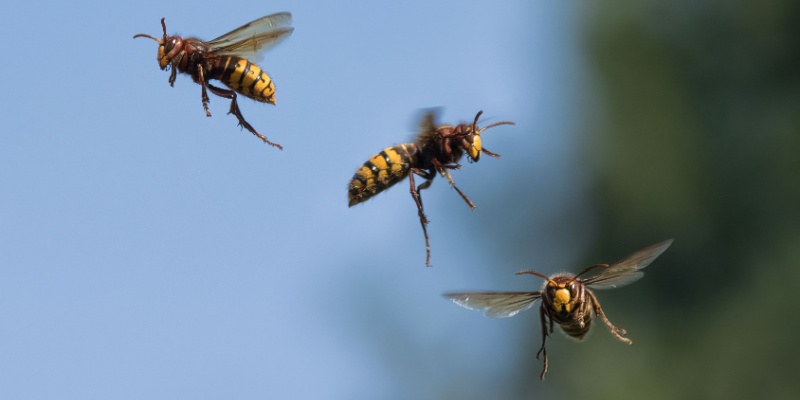When Indianapolis residents spot large stinging insects around their homes, they often wonder whether they're dealing with hornets and how concerned they should be. Understanding the prevalence, identification, and behavior of hornets in our region can help homeowners respond appropriately to these intimidating insects.
Hornet Species in Indianapolis
Despite common misconceptions, true hornets are relatively rare in Indianapolis. The area is home to:
Bald-Faced Hornets
These are the most common "hornets" in Indianapolis, though they're actually a type of yellowjacket wasp, not true hornets.
Identification:
- Large (1/2 to 5/8 inch workers, queens slightly larger)
- Black bodies with distinctive white markings on face and abdomen
- Build large, gray, football-shaped paper nests in trees, bushes, or on structures
Prevalence: Common throughout Indianapolis and surrounding areas
European Hornets
These are the only true hornets found in Indiana, having been introduced from Europe in the 1800s.
Identification:
- Very large (3/4 to 1-1/2 inches long)
- Brown with yellow stripes on abdomen
- Distinctive yellow face with brown markings
- Build nests in hollow trees, wall voids, attics, and outbuildings
Prevalence: Uncommon in Indianapolis, but their range has been expanding
How Common Are Hornet Problems?
Bald-Faced Hornet Frequency
Bald-faced hornets are relatively common in Indianapolis, but serious problems are limited by several factors:
- Nests are typically built high in trees or bushes, away from human activity
- Colonies last only one season, dying off after the first hard freeze
- Most homeowners notice and address nests before they reach problematic size
- Each queen establishes her own nest, limiting colony density
Trio Pest Control typically sees increased bald-faced hornet activity in:
- Wooded residential areas
- Properties with mature trees
- Homes near parks or natural areas
- Areas with abundant flowering plants
European Hornet Frequency
True European hornet encounters are uncommon in Indianapolis, but have increased in recent years:
- Originally concentrated in eastern states, their range has gradually expanded westward
- Climate change may be contributing to their spread into the Midwest
- Most Indianapolis residents will never encounter a European hornet nest
- When found, they're most common in rural or semi-rural properties on the outskirts of the metropolitan area
When Hornets Become Problematic
While the mere presence of hornets doesn't necessarily constitute a problem, certain situations warrant concern:
Location Issues
Hornet nests become problematic when located:
- Near entrances to homes or buildings
- In areas with frequent human activity
- On playground equipment or recreational structures
- Near decks or patios
- At heights where they might be accidentally disturbed
- Inside structural voids of homes
Timing Concerns
Hornet issues tend to follow seasonal patterns:
- Spring (April-May): Queens emerge and begin nest construction
- Early Summer (June-July): Colonies grow but typically aren't aggressive
- Late Summer/Fall (August-October): Colonies reach maximum size (200-700 workers) and become more defensive
- First Freeze: Colonies die out, except for newly produced queens that overwinter
Problems are most common in late summer when colonies are largest and most defensive.
Allergic Sensitivity
For approximately 3% of adults with venom allergies, even a single hornet sting can trigger serious reactions requiring emergency care. Families with allergic members should treat any nearby hornet nest as a serious concern.
Hornet Benefits in the Ecosystem
Despite their intimidating reputation, hornets provide significant ecological benefits:
- They're voracious predators of flies, yellowjackets, and other nuisance insects
- A single colony can consume thousands of flies and caterpillars during a season
- They help control garden pest populations
- They pollinate flowers while foraging for nectar
- They help maintain natural balance in Indianapolis' urban ecosystem
These benefits often outweigh risks when nests are located away from human activity.
Comparing Hornet Risk to Other Stinging Insects
When assessing stinging insect concerns in Indianapolis, it's helpful to understand relative risk:
Yellowjackets:
- Much more common than hornets
- Frequently nest underground or in structures
- More aggressive than hornets, especially around food
- Responsible for the majority of stinging incidents
Paper Wasps:
- Extremely common throughout Indianapolis
- Build open, umbrella-shaped nests on structures
- Less aggressive than hornets when not disturbed
- Nests are usually smaller than hornet nests
Honeybees:
- Managed colonies common throughout the area
- Rarely aggressive unless their hive is threatened
- Beneficial pollinators that should be preserved when possible
Bumblebees:
- Common ground-nesters
- Generally non-aggressive unless their nest is disturbed
- Important native pollinators
Compared to these insects, hornets typically cause fewer problems for Indianapolis residents due to their habitat preferences and relative scarcity (especially European hornets).
Professional Hornet Control
When hornet nests pose legitimate risks, professional removal offers significant advantages:
- Safety: Trained technicians have proper protective equipment
- Effectiveness: Complete elimination without stirring defensive behavior
- Property protection: Avoiding damage during removal
- Expert identification: Distinguishing harmless look-alikes from actual hornets
- Preventive advice: Recommendations to discourage future nesting
Trio Pest Control's Approach to Hornets
At Trio Pest Control, we take a balanced approach to hornet management:
- Accurate identification of the specific species involved
- Risk assessment based on nest location, size, and household factors
- Customized recommendations that may include monitoring, removal, or protection strategies
- Environmentally responsible methods that minimize impact on beneficial insects
- Education about preventing future nesting issues
For hornet nests that require removal, our experienced technicians use specialized equipment and techniques to safely eliminate the colony while protecting your family.
Contact Trio Pest Control today for professional assessment and management of hornet nests throughout the Indianapolis area.
